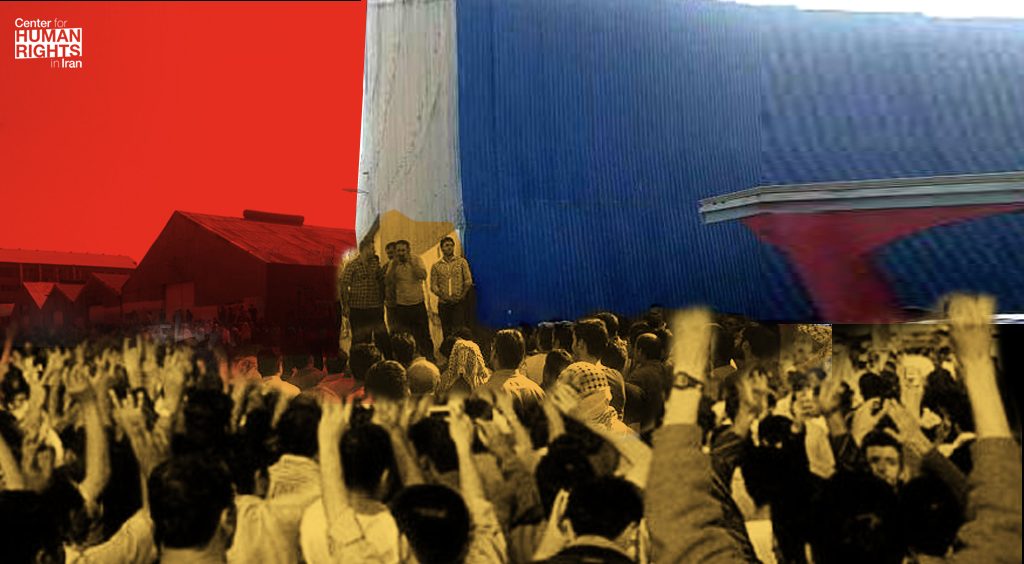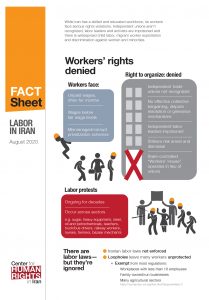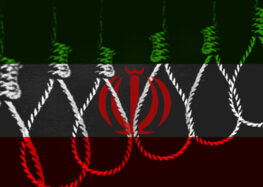Showdown at Haft Tappeh Sugar Factory: Minor Win for Workers, Larger Abuses Left Unchecked
 Court Annuls Privatization of Company but Unpaid Wages and Withheld Insurance Benefits Persist
Court Annuls Privatization of Company but Unpaid Wages and Withheld Insurance Benefits Persist
“We are going to witness a big wave of labor protests spreading from the south to other parts of the country”
It has been almost three months since the workers at Iran’s Haft Tappeh Cane Sugar Agro-Industrial Company, in the southwestern city of Shush, Khuzestan Province, began their latest round of peaceful protests. Like many workers throughout Iran, they have faced chronically unpaid wages and benefits and corrupt privatization schemes that have exacerbated abuses against workers.
Yet with independent unions unrecognized, labor activism criminalized, and labor leaders routinely jailed in Iran, workers face an uphill battle to make their voices heard and rights violations addressed.
The Haft Tappeh sugar factory has been the focus of persistent labor protests over the last several years, and the struggle there can be seen as a microcosm of the broader struggle for labor rights in Iran, where abuses against workers go unchecked.
Surprisingly, the workers there recently won a small victory. After investigating the circumstances of the 2016 sale of Haft Tappeh, which had been state-owned, to its present private owners, and the company’s performance since the privatization of the company, a state auditing court ruled the sale should be annulled.
The removal of the new private owner, Omid Asadbeigi, who had continued to violate numerous worker rights, had been one of the workers’ central demands. Yet many serious worker issues remain unaddressed at Haft Tappeh, as they are in companies across Iran, and labor activists predict more protests and strikes across the county in the coming months.
A Corrupt Privatization Scheme
The Haft Tappeh sugar mill, located 8.7 miles from the city of Shush, in an area covering more than 60,000 acres, was established by the state in 1961. It currently employs 5,900 workers, including those with permanent and seasonal contracts.
While Haft Tappeh workers have periodically faced violations such as unpaid wages and insurance benefits for many years, the current problems at the company began after it was sold to the private sector in 2016.
In February 2016, the Iranian Privatization Organization a state organization under the authority of the Ministry of Economic Affairs and Finance (IPO) that handles the sale of state-owned enterprises to the private sector, sold 100 percent of Haft Tappeh’s shares to 28-year-old Omid Asadbeigi and 31-year-old Mehrdad Rostami, owners of Zeus Holding and Ariak Electric, for an initial down payment of six billion tomans ($2.1 million USD based on the official rate at the time).
According to the IPO’s report, at the time of the sale, the Haft Tappeh company owed 150 billion tomans ($50.3 million USD) to Iran’s Social Security Organization (SSO) alone, which means it had failed to pay its share of social security to the government for many years.
In addition, according to Ali Ashraf Abdollahpouri Hosseini, who was then the head of the IPO organization, the company’s accumulated debt at the time of the sale was about 345 billion tomans ($116 million USD)—and the employees and workers had not been paid for seven months.
“They say the company owes a lot to the SSO but it should be noted that in all those years social security payments were deducted from workers’ salaries every month,” labor rights activist Meysam Alemahdi told the Center for Human Rights in Iran (CHRI).
Alemahdi believes that the company’s lack of payment to the SSO was the result of private “wheelings and dealings” between the company’s executives and SSO’s officials, ultimately hurting the workers who had paid their social security fees.
Workers Paid for Health Insurance but Never Received It
At the time of Haft Tappeh’s sale to the private owners, it had been argued that the sale would help the company resolve the wage and health insurance problems that had been occurring periodically for many months prior to the sale. Yet the same issues persisted under the new owners, prompting renewed and growing protests by the workers.
The first major wave of protests by the Haft Tappeh workers took place in November 2018, with some 300-400 workers, plus their families, peacefully protesting multiple worker abuses. Among their demands was payment of back wages that had long gone unpaid, and health insurance benefits that they had been paying for but not receiving.
While payment for health insurance was being deducted every month from the workers’ paychecks, they could not receive doctors’ services or medicines because their employee-issued benefits cards were invalid due to the company’s nonpayment of funds into the insurance accounts.
With abuses continuing under the new owners, on top of questionable aspects of the sale, the workers argued for a reversal of the company’s privatization and for management of the company to be handed over to a labor collective so that these critical wage and benefits issues would finally be addressed.
Workers Jailed, Tortured for Protesting
On November 20, 2018, several Haft Tappeh workers who had participated in the protests and activists were arrested by security forces, including Esmail Bakhshi, one of the leading workers’ representatives. Bakhshi, once in state custody, was tortured and forced into making false “confessions.” Sepideh Qoliyan, an independent labor journalist who was reporting on the protests at Haft Tappeh, was also detained and tortured.
On December 14, 2019, Branch 36 of the Appeals Court in Tehran sentenced nine labor activists to five years in prison, on the charge of “assembly and collusion against national security” in connection with the Haft Tappeh protests.
In addition to Bakhshi and fellow Haft Tappeh labor representative Mohammad Khanifar, the defendants were independent labor reporters Sepideh Qoliyan, Atefeh Rangriz, Amirhossein Mohammadifard, Sanaz Allahyari, Amir Amirgholi, Asal Mohammadi, and Marzieh Amiri.
All have been pardoned, except for Qoliyan, who began serving her five-year prison sentence on June 21, 2020.
State Goes After Haft Tappeh CEO for Corruption, Not Worker Abuses
After the first wave of protests, CEO Asadbeigi pledged to bring the company into profitability and rehire several dozen workers who had been laid off. However, all of the problems continued and in late June 2020, protests resumed.
In the meantime, Asadbeigi, along with several others, was put on trial in May and June 2020 on the charge of “disrupting the country’s foreign exchange system,” including selling $1.5 billion in state-allocated U.S. dollars in the black market at several times higher than the official rate.
“The workers object to the fact that the judge has granted Asadbeigi, the primary defendant, conditional release during the trial supposedly to allow him to deal with the workers’ back wages… but his co-defendants [other individuals who were being prosecuted for foreign exchange fraud] remain in detention,” said a statement from the Haft Tappeh Workers Syndicate on June 16, 2020.
“We suspect that he is using the issue of back wages as an excuse to gain judicial immunity, avoid being in detention and ultimately escape conviction and imprisonment,” the statement added.
On July 15, 2020, a few weeks after the Haft Tappeh labor protests resumed, Farzaneh Zilabi, who is the lawyer for a number of the company’s workers, reported that four of her clients had been arrested.
“My clients, Moselm Cheshmehkhavar, Yousef Bahmani, Ebrahim Abbasi and Mohammad Khanifar were arrested by the security police in Shush and transferred to prison in Dezful,” she said.
She added that Khanifar and Bahmani were recovering from COVID-19 virus when they were taken into custody. (They were subsequently released.)
On June 29, 2020, during the 10th session of Asadbeigi’s trial, Bahmani had spoken as a witness on behalf of fellow Haft Tappeh workers and told the judge that the company’s owners were using the workers as “human shields” to escape prosecution.
“Your honor,” Bahmani addressed the judge, “Why is it that when I, as a worker, demand my rights, they put me behind bars on trumped up charges but Omid Asabeigi, despite a mountain of corruption, walks around freely in his nice suit? Where’s the justice in that?”
Bahmani added: “Since the private sector [took over the Haft Tappeh company], it has brought nothing but hardship, pain and misery… We demand the removal of these gentlemen from the company and payment of all our salaries, insurance premiums and other benefits.”
Meanwhile on July 14, 2020, the Haft Tappeh workers’ news channel on Telegram reported that Mohammad Reza Dabirian, another Haft Tappeh worker, was sentenced to 222 lashes by a Revolutionary Court in Shush for “insulting officials, slander and publishing falsehoods.”
The sentence was issued in absentia as Dabirian had contracted COVID-19 and could not attend to defend himself. His lawyer requested a retrial which took place on August 9, 2020. No verdict has yet been issued.
Parliament Weighs In, Court Rules Owners Must Go
On July 22, 2020, the third session of a parliamentary investigation into Haft Tappeh’s woes was held in the presence of Finance Minister Farhad Dejpasand, members of Parliament, representatives from the Labor Ministry, the Supreme Auditing Court and Khuzestan Province Governor’s Office, as well as labor activists.
“If the IPO and the Ministry of Finance do not strip current executives of their ownership of the Haft Tappeh company, we would have no choice but to use our authority to impeach the finance minister,” Member of Parliament Nezamoddin Mousavi told the court.
Then on September 7, 2020, Mousavi tweeted that the Supreme Auditing Court, a state body that handles the financial activities of ministries, state institutions, SOEs and other organizations financed by the state, had ruled that Haft Tappeh’s sale must be annulled “due to violations in transferring the ownership of the company, failure to achieve goals set by the sale and the buyers’ bad faith in honoring their commitments.”
On the same day following the court’s ruling the Haft Tappeh Workers Syndicate issued a statement declaring a temporary halt in their protest.
Workers Declare Initial Victory but Hope for Labor Collective Still Distant Dream
“We can declare that the workers have achieved their first victory and taken a step forward,” said the statement. “But the workers’ primary demand for the complete elimination of private ownership [of the company] must be realized.”
The statement continued: “Haft Tappeh workers know well that their struggle will continue until the private sector is fully removed from the company and that will not happen just by getting rid of Asadbeigi, Rostami and their cohorts. You can’t just replace the pieces and continue this game.”
“Haft Tappeh should not be owned by any individual or organization. Only the Haft Tappeh workers can run and manage this agro-industrial company in the best possible way,” it added.
While many workers have argued that ownership should be transferred to a workers’ collective, some workers believe a reversion to state ownership is acceptable, particularly to ensure the provision of state assistance, as long as workers remain in control. What all workers seem to agree on is that the privatization of the company has been disastrous, and that given the record of worker violations under both state and private ownership, management of the company must be in the hands of the workers.
Labor rights activist Alemahdi told CHRI that he does not expect the next stages of the Haft Tappeh saga will necessarily go smoothly for the workers. If the Supreme Auditing Court’s ruling is carried out there are three possibilities, he said.
First, the company could be returned to government ownership. Second, the workers could be given the chance to run it as a cooperative, as they have demanded all along. Or it could be sold to a new private buyer.
“Asadbeigi and his management team fell out of favor with the authorities themselves and that’s why they are being ousted, not because of the labor protests and demands,” Alemahdi said.
He added: “In the coming months we are going to witness a big wave of labor protests and strikes spreading from the south to other parts of the country…”
Abuse of Workers is Critical Issue Across Iran
The struggle by workers at the Haft Tappeh sugar complex against severe violations is by no means an anomaly; workers face chronically unpaid wages and undelivered health insurance benefits, and suffer the consequences of corrupt privatization schemes, in companies and industries across the country.
There have been significant worker protests over similar issues at the Tabriz Machinery Manufacturing Company, in Tabriz, East Azerbaijan Province; at the Hepco Arak Company, in Arak, Markazi Province; at AzarAb Arak Industries, also in Arak; and at the Almahdi Aluminum Company, in Bandar Abbas, Hormozgan province. Protests have even reached Iran’s critical oil industry, with workers in the country’s oil refining, petrochemicals and drilling industries striking in southern Iran over working conditions and unpaid wages.
The issues that brought Haft Tappeh workers and so many other workers to protest are not the only critical labor problems in Iran, workers also face wages that are often below fair-wage levels; unsafe work conditions; the under-provision of insurance even though it is required; the widespread use of temporary contracts that deprive workers of security and benefits; discrimination in the workplace based on gender, religion, ethnicity, sexuality and disabilities; and the widespread exploitation of children and migrants in the labor market.
The Haft Tappeh workers may have scored an initial win with the ruling; it remains to be seen how it will be implemented—and if another corrupt ownership scheme will simply emerge that leaves worker violations unaddressed.
With state-run courts deciding the outcomes of labor disputes, independent unions unable to effectively bargain collectively or press grievances, and labor leaders jailed when they advocate for labor rights, the outlook for workers in Iran looks grim.







